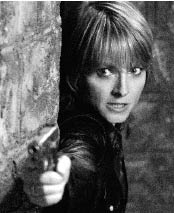Dirty Harriet: The Brave One
by George Sax

Usually, the machine-tooled marketing hyperbole of movie studios and filmmakers is hardly worth noticing. Does anyone outside the industry pay much attention to this stuff?
But in the case of Neil Jordan’s new vigilante revenge thriller, The Brave One, the filmmakers’ promotional comments, particularly those of its star, Jodie Foster, are a little more interesting and may even reflect an ambivalence, perhaps a mild unease, about what they’ve wrought. They suggest they’re concerned that the movie won’t be taken seriously enough.
Foster, who claims to have reworked the script and to have helped hire Jordan, even denied to a New York magazine interviewer that it is a revenge thriller. It’s really about the deeply conflicted nature of New Yorkers’ relationship with their city, she told him.
Of course, Jordan told a Variety editor that Foster’s movie character “is a revenge killer…It’s a trail of revenge she’s embarked on.” Both of them have noted the moral subtlety and ethical complexities they ascribe to their movie.
I’ll be candid about this before I go any further: The Brave One isn’t conceptually complex or involving. It’s muddled and clumsily exaggerated. If it were as darkly transgressive as its makers evidently intended, it would be a truly disturbing work, on more than one level.
Foster is Erica Bain, a New York FM radio monologist, an audio essayist who weaves impressionistic prose poems about the city’s little human surprises. A woman vaguely of early middle age, she has a live-in fiancée, a doctor of Asian descent with a British-influenced accent (Naveen Andrews), who actually seems a little young for her.
One night, after her show and his hospital shift, they walk in the park with their dog, in a section marked by a sign reading “Strangers Gate” (mark that sign), where they’re set upon and beaten by urban savages. He dies. She awakens after three weeks in the hospital and begins to mend physically, but not spiritually, of course. Far from it.
For reasons not really made clear, she goes out and illegally obtains a nine-millimeter handgun. She scores this weapon so easily, in a matter of minutes, that one might easily be led to reconsider any previous reservations about the NRA’s disdain for the ineffectiveness of gun regulation.
When Erica returns to her show with a new more somber, more personal style, she tells her listeners that once she never knew fear in New York. What she doesn’t tell them is how she spends her off-time. Wouldn’t you know it, she can hardly step outside her building now without encountering some scum-sucking, semi-human goon who needs offing: in a bodega, on the subway, on night-darkened streets. Eventually, she sets out to stalk the three scumbags who killed her fiancée. Meanwhile, she has begun to bond with a homicide detective (Terrence Howard) who has his own nagging doubts about the probability of achieving official justice, particularly after a high-profile case against a mobster goes nowhere.
This dual parallelism doesn’t really work, partly because the two leads don’t play off each other well enough. Foster is effective enough as a ravaged soul, but her nervous, post- traumatic survivor doesn’t meld with Howard’s almost laidback performance. But there are more serious problems with the film.
On my way out of the packed theater where the movie previewed, I heard a woman say, “It was a good movie, but it was ridiculous.” I wouldn’t have put it that way, but I think I know what she meant.
Jordan (The Crying Game) is much too proficient and inventive a director to turn out a real stinker, technically speaking. His lurid, alienating, but slightly alluring atmospherics and scene-setting show his usual skills at work. In one quietly riveting, slightly concave panoramic night shot, held stationary for several seconds, Erica is shown lying on the ground in a cemetery as an elevated train rolls along above her. (Phillipe Rousselot is the cinematographer.)
But the movie’s clanking, arbitrary implausibilities combine with the filmmakers’ self-serious posturing to make The Brave One a failure, even as slickly engineered exploitation fare in the Dirty Harry mode. Weak links to the Iraq war and the use of horribly corrupted boy soldiers in Africa’s insurgencies are summoned up to make sure we get the seriousness of what’s being presented.
Erica’s voiceover mournfully observes that “There’s no going back; there’s just this stranger.” (Remember the sign?) She finds this new personality in the mirrors she keeps staring into. There’s a tone of faux-existential metaphysics, a middle-brow, Hollywood-liberal ethical attitudinizing infusing the movie.
If we were to take this movie the way its creators seem to want us to—in particular its pumped, morally dubious ending—it would be disturbing and obnoxious. But, as the woman in the multiplex observed, it’s too ridiculously over the top for us to let it get under our skin.
|
Issue Navigation> Issue Index > v6n37: Northern Lights (9/13/07) > Film Reviews > Dirty Harriet: The Brave One This Week's Issue • Artvoice Daily • Artvoice TV • Events Calendar • Classifieds |









 Current Issue
Current Issue